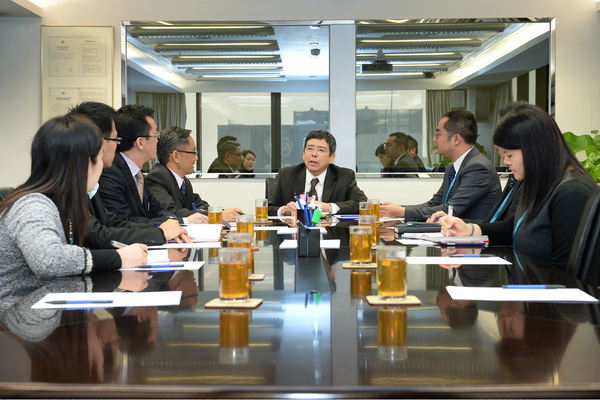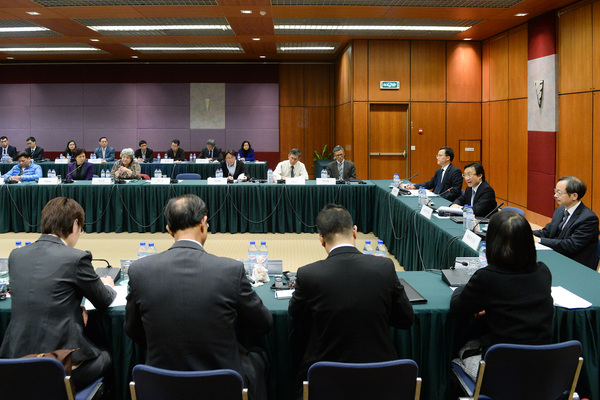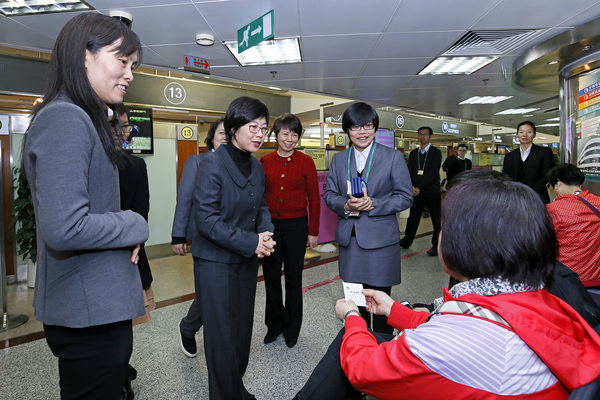Macao SAR Government Portal
News
Consumer Council handled around 7,000 cases in 2014
Consumer Council received a total of 6,981 cases last year; of which 1,668 cases were complaints, 5,250 cases were inquiries, and 63 cases were suggestions. The total number of cases of the top 5 categories of complaints amounted to 749, which was about 45 percent of the total. The top 5 categories were telecommunication services (220 cases), telecommunication equipment and supplies (208 cases), food and beverages (121 cases), electrical appliances (113 cases), and public transportation (87 cases). When compared the top 5 categories of complaints in 2013 with those in 2014, the top 4 categories remained unchanged, while the category of public transportation, which ranked the 5th in 2014, had replaced tourism. The number of cases received for each category and the total number of complaint cases received in 2014 were similar to those received in 2013. A detailed analysis of the number of cases received in 2014 will be published later by the Council in its monthly magazine Consumer Report.
…
Stamp issue date
Macao Post announces that the issue date of the stamp issue "25 Years of AICEP" will be on 27th April 2015.
…
Macao Post issues "Annual Album 2014"
Macao Post will issue an exquisite "Annual Album 2014" on 28th January 2015. The protective hardcover is printed with the lifelike horse, together with the hot foil stamping with golden words, bringing sense of simple and elegant. This album comprises the full collection of 13 sets of stamps and 11 souvenir sheets issued in 2014, on which the colour stamp images and the technical data are printed on the pages. This Annual Album 2014 will be available for sale at the Philatelic Shop of Macao Post Headquarters, "Rua do Campo" Post Office, Maritime Ferry Terminal Post Office, Airport Post Office, and the Communications Museum. The selling price is MOP418.00 each, it is certainly an excellent product, either as a collectable or as an elegant gift. Customers can also purchase the empty Annual Album, by which the purchased 2014 Macao's stamps and souvenir sheets can be protectively organized. Empty Annual Album is priced at MOP110.00.
…
HOFEX 2015 – The 16th International Exhibition of Food & Drink, Hotel, Restaurant & Foodservice Equipment, Supplies & Services
Organized by the Hong Kong Exhibition Services Ltd. and Allword Exhibitions, HOFEX 2015 – The 16th International Exhibition of Food & Drink, Hotel, Restaurant & Foodservice Equipment, Supplies & Services, will take place at the Hong Kong Convention and Exhibition Centre, in Hong Kong, from May 6 to 9, 2015. HOFEX will showcase a vast array of the world´s newest hotel and catering supplies, as well as the most fashionable food and beverage products. According to the statistics provided by the Organizers, the last edition of HOFEX (held in 2013) has attracted 1,800 exhibitors from 48 countries and regions, including 44 official delegations, to create a comprehensive business platform. The 4-day event registered the largest number of visitors ever, including 30,718 quality buyers, of which, 30,27% were overseas buyers from 85 countries and regions. Together with the concurrent events, including forums, competitions and guest media, total number of admissions reached 33,409. HOFEX – the 16th International Exhibition of Food & Drink, Hotel, Restaurant & Foodservice Equipment, Supplies & Services also provided an excellent opportunity for the catering and hotel industry to observe and exchange ideas. A number of exciting activities have been planned for the coming edition of HOFEX, including "2015 Hong Kong International Culinary Classic2, "All World Open Cup 2015 – Cocktail Creative Classic & Bartending Flair", "Regional Hotel General Managers´ Forum", "Hospitality Technology Conference" and "Asian Club Managers´ Forum". All these events will not only provide a learning and exchange platform for the participants, but will also serve as an inspiration when analysing the development trends of the hospitality and catering industry. Having participated consecutively in the three previous editions of HOFEX, Macao Trade and Investment Promotion Institute ((IPIM) plans to set-up a "Macao Pavilion" at the HOFEX 2015 venue. Local enterprises in the relevant field (including wine, food, hotel supplies and catering equipment) interested to participate as exhibitors are invited to contact Mr. Chang, of IPIM´s Promotion Activities Department (Tel: 87989267 or e-mail kei changîpim.gov.mo). Due to the limited number of booths available, first-come, first-served basis applies.
…
Strengthen monitoring on construction to make best use of public funds

The Secretary for Transport and Public Works, Mr Raimundo Rosario, said the government would strengthen the management on large-scale constructions to ensure best use of the public funds,when he visited the departments supervise the public projects The Government would make more efforts to monitor constructions quality, make more advanced preparation and be more cautious with budget proposals, he said when he visited departments that supervised construction of public projects. The Secretary visited the Transportation Infrastructure Office and the Infrastructure Development Office on the 21 January, where he also had meetings with the officials to get a better understanding on the progress of public projects construction. To tackle challenges faced on the Light Rapid Transit projects, he said the Government would spare no effort to make up for the schedules and be more cautious in spending public funds and further enhance working efficiency.
…
Government works in partnership with agencies for the disadvantaged

The Government would work closely with the social services sector to provide more working opportunities to the disadvantaged group, the Secretary for Social Affairs and Culture, Mr Tam Chon Weng, had said. In consideration of the difficulties the sector had countered, the Government would consider buying industrial buildings or to provide rental subsidies for them in view of increasing rents. Mr Tam was speaking to reporters after a meeting with representatives of social services associations on 22 January, where they exchanged views on the welfare and salaries of personnel in the sector, adolescents' issues, difficulties on running social services and facilities for the physically challenged. When asked, he said he was confident that the Islands District Medical Complex would come into operation in 2017. To be more transparent on the schedule and budget, the Government would brief the Legislative Assembly fully in due course, he added.
…
Visitor arrivals for December 2014
Information from the Statistics and Census Service (DSEC) indicated that visitor arrivals decreased by 1.8% year-on-year to 2,540,070 in December 2014; same-day visitors accounted for 54% of the total, at 1,375,681. Analysed by place of residence, visitors from Mainland China increased by 1% year-on-year to 1,638,854, coming primarily from Guangdong Province (654,325) and Fujian Province (70,404); Mainland visitors travelling under the Individual Visit Scheme rose by 6%, at 740,906. Visitors from the Republic of Korea (47,346) increased by 2% year-on-year, while those from Hong Kong (545,772) and Taiwan (78,150) decreased by 4% and 10% respectively. Long-haul visitors from the United States (14,859), Australia (9,563), Canada (6,501) and the United Kingdom (4,356) registered year-on-year decline. The average length of stay of visitors decreased by 0.1 day year-on-year to 0.9 day in December 2014; overnight and same-day visitors had an average stay of 1.9 days and 0.2 day respectively. For the whole year of 2014, visitor arrivals reached a record high of 31,525,632, up by 7.5% year-on-year; same-day visitors amounted to 16,959,949, sharing 54% of the total. Visitors from Mainland China (21,252,410), the Republic of Korea (554,521) and Japan (299,849) increased year-on-year, while those from Hong Kong (6,426,608) and Taiwan (953,753) decreased. Moreover, visitors from the United States recorded year-on-year increase; however, those from Australia, Canada and the United Kingdom registered decrease. In 2014, the average length of stay of visitors held stable as in 2013, at 1.0 day.
…
CE to visit Beijing to strengthen ties in regional co-operation
The Chief Executive, Mr Chui Sai On, will lead an official delegation to the capital from 25-28 January to exchange views on strengthening regional co-operation and industry of traditional Chinese medicine with relevant departments.
Mr. Chui is scheduled to meet with the Minister of Commerce, Mr Gao Hucheng, the Director of the National Development and Reform Commission, Mr Xu Shaoshi and the Commissioner of the State Administration of the Traditional Chinese Medicine, Mr Wang Guoqiang during his four-day visit in Beijing.
The Secretary for Economy and Finance, Mr Leong's Vai Tac, Chief-of-Office of the Chief Executive's Office, Ms O Lam, the Chief-of-Office of the Secretary for Economy and Finance, Ms Lok Kit Sim and the Director of the Government Information Bureau, Mr Chan Chi Ping will also present in the delegation.
The Secretary for Administration and Justice, Ms Chan Hoi Fan will be the acting Chief Executive while Mr. Chui is away.
…
Follow policy principles on administrative reforms

To put the people first, to carry out missions pro-actively, to improve on timelines and have the courage to assume responsibilities are the policy principles to be followed to conduct administrative reforms, according to the Secretary for Administration and Justice, Ms Chan Hoi Fan. Ms Chan made these comments during her visits to the Printing Bureau and the Legal and Judicial Training Centre on 19 January; the following two days, she visited different registry departments and notary offices, the Law Reform and International Law Bureau and the Identification Services Bureau. She spoke highly of their achievements over the years and thanked them for their efforts to enhance public services; but more technology should be implemented to further enhance work efficiency. The Government attaches great importance to the principle of legal ruling, urging the officials to put more efforts in grouping more legal personnel, increasing efficiency on legal reform, especially the laws related to the people's livelihood and the fundamentals of the rule of law.
…
Amended budget-making proposals to go to the legislature
Revision of the Budget Framework Law would be completed by the first quarter of this year and expected to be approved by the Legislative Assembly in 2016, according to the Secretary for Economy and Finance, Mr Leong Vai Tac. If the processes are on schedule, the revised version could be applied to close the fiscal year 2016 and prepare the budget proposals for fiscal year 2017, he said. Speaking to reporters after attending a standing committee of the Legislative Assembly, Mr Leong said the Government would need a double-entry bookkeeping system to better monitor public spending. Upon completion of drafting, the proposal would be given to legal department for more professional opinions, he said. The Government paid full attention to the public's views and would consider conducting a public consultation to collect more opinions; but at this stage he would focus on drafting the proposals, he said.
…

